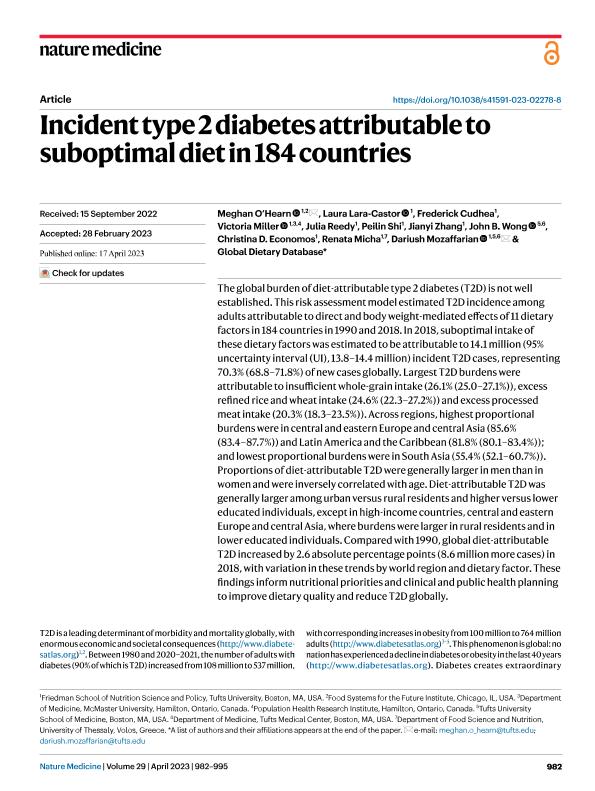Artículo
Incident type 2 diabetes attributable to suboptimal diet in 184 countries
O’Hearn, Meghan; Lara Castor, Laura; Cudhea, Frederick; Miller, Victoria; Reedy, Julia; Shi, Peilin; Zhang, Jianyi; Wong, John B.; Economos, Christina D.; Micha, Renata; Mozaffarian, Dariush; Caballero, Mauricio Tomás ; Global Dietary Database
; Global Dietary Database
 ; Global Dietary Database
; Global Dietary Database
Fecha de publicación:
04/2023
Editorial:
Nature Publishing Group
Revista:
Nature Medicine
ISSN:
1078-8956
Idioma:
Inglés
Tipo de recurso:
Artículo publicado
Clasificación temática:
Resumen
The global burden of diet-attributable type 2 diabetes (T2D) is not well established. This risk assessment model estimated T2D incidence among adults attributable to direct and body weight-mediated effects of 11 dietary factors in 184 countries in 1990 and 2018. In 2018, suboptimal intake of these dietary factors was estimated to be attributable to 14.1 million (95% uncertainty interval (UI), 13.8–14.4 million) incident T2D cases, representing 70.3% (68.8–71.8%) of new cases globally. Largest T2D burdens were attributable to insufficient whole-grain intake (26.1% (25.0–27.1%)), excess refined rice and wheat intake (24.6% (22.3–27.2%)) and excess processed meat intake (20.3% (18.3–23.5%)). Across regions, highest proportional burdens were in central and eastern Europe and central Asia (85.6% (83.4–87.7%)) and Latin America and the Caribbean (81.8% (80.1–83.4%)); and lowest proportional burdens were in South Asia (55.4% (52.1–60.7%)). Proportions of diet-attributable T2D were generally larger in men than in women and were inversely correlated with age. Diet-attributable T2D was generally larger among urban versus rural residents and higher versus lower educated individuals, except in high-income countries, central and eastern Europe and central Asia, where burdens were larger in rural residents and in lower educated individuals. Compared with 1990, global diet-attributable T2D increased by 2.6 absolute percentage points (8.6 million more cases) in 2018, with variation in these trends by world region and dietary factor. These findings inform nutritional priorities and clinical and public health planning to improve dietary quality and reduce T2D globally.
Palabras clave:
Nutricion
,
Alimentacion
,
diabetes
,
epidemiologia
Archivos asociados
Licencia
Identificadores
Colecciones
Articulos(SEDE CENTRAL)
Articulos de SEDE CENTRAL
Articulos de SEDE CENTRAL
Citación
O’Hearn, Meghan; Lara Castor, Laura; Cudhea, Frederick; Miller, Victoria; Reedy, Julia; et al.; Incident type 2 diabetes attributable to suboptimal diet in 184 countries; Nature Publishing Group; Nature Medicine; 29; 4; 4-2023; 982-995
Compartir
Altmétricas



